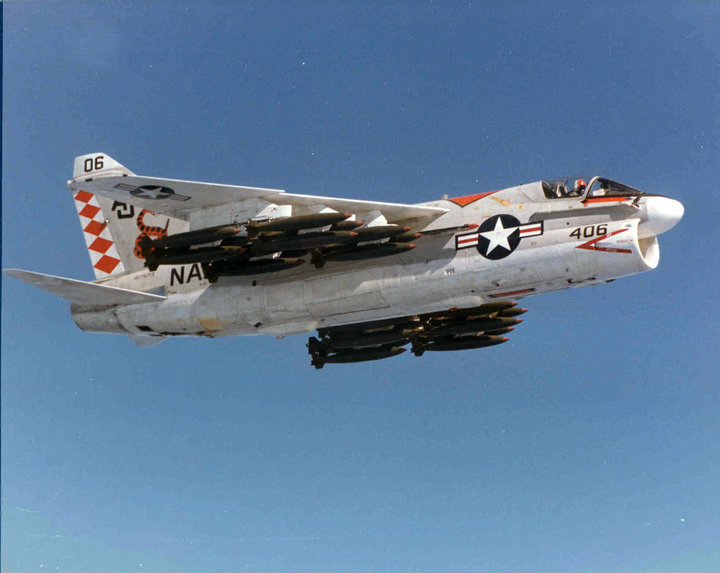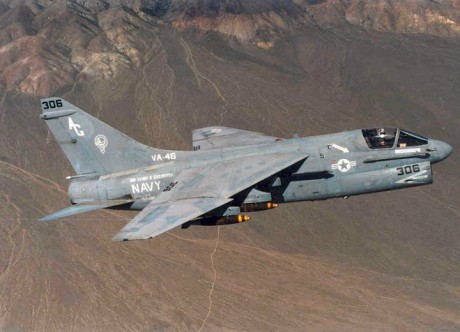
Posted on 08/08/2013 4:30:48 PM PDT by sukhoi-30mki
A-7 Corsair II and the VAL program: how a multiservice aircraft should be developed

There are several examples of combat aircraft that were born with the aim to serve in two or three different services of the same nation in aviation history.
Usually, these programs face many problems before they reach their full operational capability and they struggle to satisfy the different customers who put them into service.
This rule is confirmed by the last of these aircraft, the Joint Strike Fighter (JSF) which generated the three different versions of the F-35, as well as an older program, the Tactical Fighter Experimental (TFX), with the USAF F-111A and the US Navy F-111B.
And while the Lightning II is eventually entering the active service in spite of several issues, the F-111 survived only in the A variant while the F-111B, destined to the U.S. Navy, was cancelled.
But among all these programs there has been also a huge success: the so called VAL (with V meaning for heavier than air; A attack; L light) from which the Vought A-7 Corsair was born.

Originally, the VAL was a 1962 joint service program for the development of an advanced light attack aircraft involving USAF, U.S. Army and U.S. Navy.
However the Air Force preferred using its existing fighters for light attack and for close air support and suspended its sustainment to the development of the program.
So the Corsair II became the result of a Navy’s specific requirement to replace the older light attack aircraft such as the AD Skyraider and the A-4 Skyhawk.
Only in 1965 USAF rejoined to the program, developing its all weather version of the Corsair II, the A-7D. This version included advanced flight and navigation displays, one of the first digital computer and also an inertial navigation system. Indeed the A-7D had a truly advanced avionics: it embedded some sophisticated systems, including the CCIP, the Continuosly Computed Impact Point that gave a real time computation of the weapon release point.
Along with the CCIP there was also the CCRP, the Continuosly Computed Release Point which would automatically deliver the weapon on the target point.
The A-7D also introduced the BFL, acronym of Bomb Fall Line which showed a “X” on the HUD indicating where the weapon would have hit if the pilot delivered the weapon at that moment.
All these tools were a great help for the development of the Navy A-7E and thanks to the Air Force introduction in the program the Naval Aviation was able to realize its own version of the Corsair II with real all weather attack capabilities.
However the A-7 wasn’t such a revolutionary aircraft like the F-35 is intended to be: in fact the Corsair II was a low risk project since its airframe was similar to the F-8 and was also simpler than the Crusader one.
Still, the last of the Vought naval aircraft achieved some impressive milestones such as accomplishing its first flight on Sept. 27, 1965 ahead of the schedule and the first training example of the aircraft was delivered to the Navy in November 1966.

All images: Naval Aviation Museum FB page
The A-7 didn’t face high cost overruns and the airplane was also able to respect the maintainability requirement with only 17 maintenance man-hours per flight hour.
Nevertheless the A-7D/Es were some of the first combat aircraft to be equipped with the Head Up Display.
Thanks to the help that every service gave each other, the Corsair II was able to satisfy its customers and become an attack platform with capabilities which they didn’t have anywhere else.
Maybe the story of the A-7 should guide the Joint Strike Fighter: a program not only affected by schedule slippage and cost overruns but that also a plane that risks to fail to meet some of its customers’ requirements.
Worked on the A7B while in VA-93 USS Midway Vietnam
bkmk
Successful platform. Nicknamed the SLUF, Short Little Ugly F(ellow).
I worked on A7Bs in VA46 on the Kennedy, and we transitioned to the A7E. The A7E was much better IMO, but the engine was kind of odd. It was that strangely shaped TF41 with the thermal limitation (because they had hot turbine issues on those)
VA-46, the Clansmen. I got attacked by four or five black guys down in Cecil Field...a guy kicked me in the ass from behind, and when I whirled around, the guy said “I don’t like your hat” and I said that was too damn bad, and that we were going to have at it, then the other guys came out from behind the barracks.
Funny, it had never occurred to me until now that he may well have thought “Klansmen” and “Clansmen” were the same thing. I thought he had something against our squadron.
Heh, like Steve Martin in “The Jerk”: “Hey! He hates these cans! Stay away from the cans!”
My father was the planning director at Vought when they developed the A-7 and was there from ‘53 to ‘82. I got to visit the manufacturing area in Grand Prairie a few times as a kid.
It was kind of a trip… :-)

;~D
One of the actual planes I worked on is in Pima as well. The F-9 cougar from VT-23. I was with VT-23 for 2 years before VA-93
When I was in the Navy, we were on the USS John F. Kennedy, in the last skipper I had on there was Capt. Jerry O. Tuttle. His nickname for himself was “SLUF”. I have to say that the guy didn’t agree with me… He actually made me kind of nervous in retrospect. I guess I’ll leave it at that, but I will say this… He resembled his nickname completely. I recall him as being a fairly short rectangular kind of guy.
I remember him coming on over the 1MC and declaring “SLUF here…”
It wasn’t right to me. I’ve always been a believer that there should be some distance between a captain and his crew. I don’t think it has to be a gulf, but I think is a grave mistake to be a chum. I firmly believe it is more (Or at least should be) of a parent-child type of relationship.
That’s awesome! A F9 Cougar! You were apparently in the Navy during a most interesting aviation transition phase… :-)
Thanks for your service… I do remember those Corsairs returning with the canopy all scratched to hell with big parallel gashes on them. I also worked on those D704 buddy stores which• could be annoying as hell to work on.
I remember one of the pilots complaining bitterly as he stood there in his flight suit with his armpits and crotch blackened with sweat under the red lights, and his hair plastered to his head. He was saying something to the effect of “SOMEBODY hit that drogue before I got to it, and there was no way I was getting anything… That cage was going back and forth…”
He was holding his helmet in one hand, and tracing the figure 8 about 2 feet across with his other hand as he said this.
Might have to bring those back into service with Obama in charge
how many bombs was that carrying?
That looks like 36 MK 81’s on MERs...
“Worked on the A7B while in VA-93 USS Midway Vietnam”
A7E, VA-25 Fist of the Fleet, USS Ranger...good ol’ days (when I was a bit younger).
That wouldn’t be considered a “light bombing mission” any more.
LOL...was it ever????
I never saw one loaded like that, usually it was 3 mk83 under each wing or occasionally two mk84 carried like drop tanks...:)
This was the 70’s after all, and there were a few occasions when our port call was longer than it should have been because there wasn’t enough money to steam and fly.
Usually, in damned Naples.
Joint strike fighter design done rite in mid-60’s and I’m not talking about F-111
Yes, once the basket got out of shape & lost its aero properties, Katie bar the door. A-6 w/ centerline store pretty stable to tank...just loud as he** from the engines. Best was the old KA-3 Skywarrior; smooth, stable, easy...like taking milk from Momma.
Disclaimer: Opinions posted on Free Republic are those of the individual posters and do not necessarily represent the opinion of Free Republic or its management. All materials posted herein are protected by copyright law and the exemption for fair use of copyrighted works.